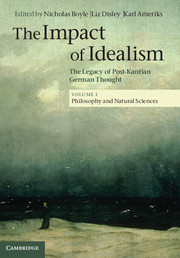Book contents
- Frontmatter
- Contents
- List of Illustrations
- List of Contributors
- Acknowledgements
- List of Abbreviations
- Foreword
- General introduction: the eighteenth and nineteenth centuries
- General introduction: the twentieth and twenty-first centuries
- Introduction: Idealism in the natural sciences and philosophy
- 1 Philosophy of natural science in Idealism and neo-Kantianism
- 2 The impact of German Idealism and Romanticism on biology in the nineteenth century
- 3 The unconscious: transcendental origins, Idealist metaphysics and psychoanalytic metapsychology
- 4 Nietzsche, Kant and teleology
- 5 Transcendental idealism, phenomenology and the metaphysics of intentionality
- 6 Heidegger and the impact of idealism
- 7 French Hegelianism and anti-Hegelianism in the 1960s: Hyppolite, Foucault and Deleuze
- 8 Scottish Idealism
- 9 ‘My station and its duties’: social-role accounts of obligation in Green and Bradley
- 10 Idealism and the origins of analytic philosophy1
- 11 Idealism and Pragmatism: the inheritance of Hegel's concept of experience
- 12 Reason's form
- Bibliography
- Index
- References
5 - Transcendental idealism, phenomenology and the metaphysics of intentionality
Published online by Cambridge University Press: 05 December 2013
- Frontmatter
- Contents
- List of Illustrations
- List of Contributors
- Acknowledgements
- List of Abbreviations
- Foreword
- General introduction: the eighteenth and nineteenth centuries
- General introduction: the twentieth and twenty-first centuries
- Introduction: Idealism in the natural sciences and philosophy
- 1 Philosophy of natural science in Idealism and neo-Kantianism
- 2 The impact of German Idealism and Romanticism on biology in the nineteenth century
- 3 The unconscious: transcendental origins, Idealist metaphysics and psychoanalytic metapsychology
- 4 Nietzsche, Kant and teleology
- 5 Transcendental idealism, phenomenology and the metaphysics of intentionality
- 6 Heidegger and the impact of idealism
- 7 French Hegelianism and anti-Hegelianism in the 1960s: Hyppolite, Foucault and Deleuze
- 8 Scottish Idealism
- 9 ‘My station and its duties’: social-role accounts of obligation in Green and Bradley
- 10 Idealism and the origins of analytic philosophy1
- 11 Idealism and Pragmatism: the inheritance of Hegel's concept of experience
- 12 Reason's form
- Bibliography
- Index
- References
Summary
What makes my representation of him into a representation of him?
L. WittgensteinIntroduction
Sometimes, fundamental philosophical influences simply go unacknowledged, although, when finally pointed out, they seem as obvious as the nose on your face. As a case in point, in this essay I argue that German Idealism has had a fundamental but unacknowledged impact on contemporary philosophy of mind and cognition, via the concept of intentionality. More specifically, I trace, unpack and then critically evaluate this impact by looking at how the theory of intentionality that is built into Kant's transcendental idealism fundamentally influenced two central figures in the Phenomenological tradition, Brentano and Husserl.
What is mind, or the mental? Three classical answers to that question are that
(i) mind is rationality, i.e., a creature's sensitivity-to-reasons and freely-willed guidedness-by-principles;
(ii) mind is consciousness, i.e., subjective experience, and;
(iii) mind is intentionality.
Intentionality, in turn, is the ‘aboutness’ of the mind, the ‘of-ness’ of the mind or the directedness of mind to objects. Here the notion of an ‘object’ is very broadly construed so as to include existing or non-existing individuals, properties, relations, facts, temporal events, spatial locations, other minds, and also one’s own mind (including one’s own intentionality), as possible targets of intentionality; and acts, states or processes of intentionality can include all sorts of cognitive or conative activities and psychological attitudes, e.g., perception, memory, thinking, apperception or selfconsciousness, judgement, belief, knowledge, rational intuition, logical reasoning, desire, love, hate, fear, and so on.
- Type
- Chapter
- Information
- The Impact of IdealismThe Legacy of Post-Kantian German Thought, pp. 191 - 224Publisher: Cambridge University PressPrint publication year: 2013
References
- 14
- Cited by



